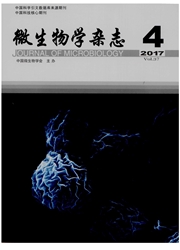

 中文摘要:
中文摘要:
以短小芽胞杆菌(Bacillus pumilus)HJ-04作为维生素C二步发酵第2步中的伴生菌,促进产酸菌产维生素C(Vitamin C,Vc)前体2-酮基-L-古龙酸(2-keto-L-gulonic acid,2-KGA)的能力强于工业生产用菌株巨大芽胞杆菌(Bacillus megaterium)B2980。采用单因素试验、Plackett-Burman(PB)试验及Box-Behnken试验对影响新菌系发酵产2-KGA的6个因素进行分析优化。结果表明,L-山梨糖、尿素、玉米浆为显著影响因子。最佳产酸条件为L-山梨糖94.95 g/L,尿素11.99 g/L,玉米浆14.13 g/L。优化后产酸量提高12.31 mg/mL,产酸周期缩短6 h。
 英文摘要:
英文摘要:
The ability of Bacillus pumilus HJ-04 to promote the production of vitamin C(VC) precursor,2-keto-L-gulonic acid(2-KGA),by 2-KGA-producing strain is stronger than industrial Bacillus megaterium B2980 as associated bacteria in second step of two-step VC fermentation.Six factors that affected the 2-KGA production by new strains system were analyzed and optimized adopting single factor test,Plackett-Burman(PB) design,and Box-Behnken design.The results indicated that L-sorbose,urea,and corn syrup were the noticeably influencing factors.The optimum acid-producing condition were 94.95 g/L of L-sorbose,11.99 g/L of urea,14.13 g/L of corn syrup.The acid production increased by 12.31 mg/mL,and the production period shortened by 6 hours after the optimization.
 同期刊论文项目
同期刊论文项目
 同项目期刊论文
同项目期刊论文
 期刊信息
期刊信息
